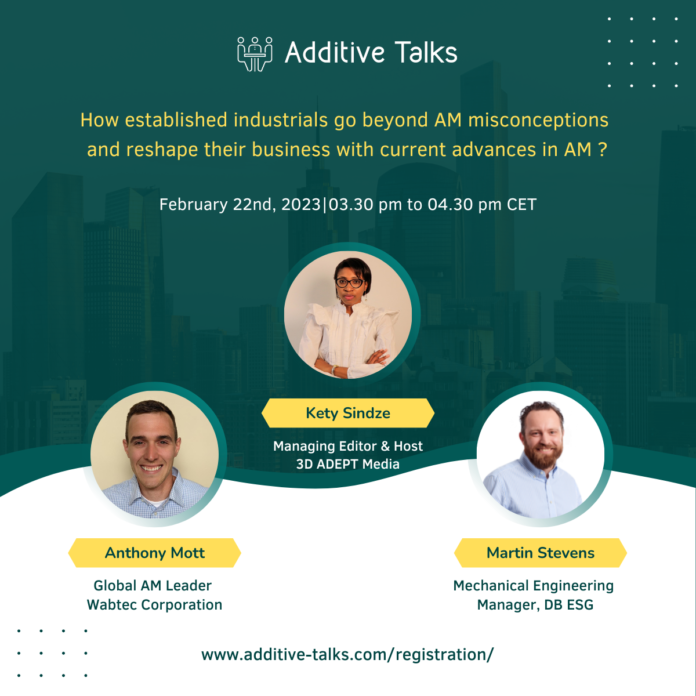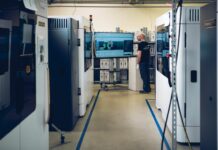The third season of the Additive Talks sessions will be filled with new guests and new topics across vertical industries adopting AM technologies. In case you’re not familiar with them, the Additive Talks are a series of virtual panels that gather AM users and insiders around a specific topic so that they can discuss challenges and solutions raised by AM in a given vertical industry.
These panels have already gathered experts from NASA, Siemens Energy, General Motors, ENGIE and more across the users range and the likes of EOS, Materialise, Fraunhofer IWS, Carbon or Solukon in the technology providers side. Our ultimate goal through these sessions, is to provide an open space where users and those who are interested in exploring AM could share questions and discuss the good, the bad and the areas for improvement – with no pitches.
The first virtual panel of this season is entitled: “How established industrials go beyond AM’s misconceptions and reshape their business with current advances in AM?”. It is set to take place on February 22nd, from 03.30 pm to 04.30 pm CET/ 09.30 am to 10.30 am New York Time.
In a context where more and more sectors of activity across the heavy industry realize the potential of AM for their production needs on the one hand, and where each of these sectors comes with its share of requirements, there is a need to sit down and assess if the pace of advances in AM enables them to adapt their business model.
With the goal of building and maintaining trains faster and at lower costs, the railway industry is one-of-a-kind sector of activity that depends a lot on stringent engineering and regulations requirements. Interestingly, in the short list of companies that are tapping into the potential of AM, Wabtec and Deutsche Bahn ESG are standing out from the crowd. In their respective region, USA and Europe, they have deployed a wide range of resources to deliver rail parts through a simplified supply chain. But is it the only business case that may enable them to stay competitive on the market? How has the integration of AM changed their business model? What are the advances of AM technologies that enable them to stay competitive? What are the challenges that they still need to overcome with the technology? What is their ambition moving forward?
These are just a couple of questions that professionals in the field are asking themselves.
This first panel ambitions to highlight mistakes and lessons on their respective use of AM technologies – that other professionals in similar industries will take into account in their exploration of AM, and hopefully reveals new insights that they could learn from each other.
Around this virtual table, one will find:
 Martin Stevens, who leads DB ESG’s Innovations projects, responsible for investigating technologies that might bring further advances to the rail sector. He is also the leader of Mobility Goes Additive’s RAILiability working group.
Martin Stevens, who leads DB ESG’s Innovations projects, responsible for investigating technologies that might bring further advances to the rail sector. He is also the leader of Mobility Goes Additive’s RAILiability working group.
Stevens has worked in the Rail Industry for over 20 years and has held a number of roles in different organisations. Responsibilities in that time have included delivery of multidisciplinary projects to leading the development of products focused on condition monitoring of infrastructure assets.
His current role is Mechanical Engineering Manager at DB ESG, a UK based subsidiary of Deutsche Bahn AG, leading a team of professional engineers. In this role, Stevens leads the technical and skills development of the team including the progression of digital manufacturing, including additive manufacturing, as an alternative to traditional methods.
DB ESG plays a significant role in the development of the UK’s railway rolling stock offering innovative and value-led advice, technical consultancy and technology integration. With an office located in Derby, home to the largest cluster of railway companies in the world, DB ESG has an excellent understanding of the UK market. They are part of DB Systemtechnik and together they combine to form Europe’s largest railway rolling stock technology consultancy. Mobility Goes Additive on the other hand, is a leading international network for industrial additive manufacturing, and RAILiability is a group of European railway operators working together to advance Additive Manufacturing within rail, sharing their best practice and collaborating on resolving the core challenges.
 Stevens will share the stage with Anthony Mott, the Global Additive Manufacturing Leader for Wabtec Corporation, a global leader in the railway industry. In this role, Mott leads a team of engineers that support other Wabtec engineers and Wabtec customers with any challenges they are facing. He helps to direct this group, which includes 4 additive manufacturing labs located around the world, to produce a variety of parts including parts in serial production. With nearly 10 years of experience in additive manufacturing, he has a well-rounded foundation of experience in applying additive technologies to a variety of industries. Prior to joining Wabtec, Mott held several roles for GE Additive including Lead Additive Manufacturing Engineer and Operations Manager. Along with these roles, he was the training leader at the site in educating customers on how to apply and integrate additive manufacturing technology into their business. Mott earned his B.S. in Polymer Engineering from Penn State Behrend and his Master’s in Additive Manufacturing and Design from Penn State University and currently resides in the Pittsburgh, Pennsylvania region.
Stevens will share the stage with Anthony Mott, the Global Additive Manufacturing Leader for Wabtec Corporation, a global leader in the railway industry. In this role, Mott leads a team of engineers that support other Wabtec engineers and Wabtec customers with any challenges they are facing. He helps to direct this group, which includes 4 additive manufacturing labs located around the world, to produce a variety of parts including parts in serial production. With nearly 10 years of experience in additive manufacturing, he has a well-rounded foundation of experience in applying additive technologies to a variety of industries. Prior to joining Wabtec, Mott held several roles for GE Additive including Lead Additive Manufacturing Engineer and Operations Manager. Along with these roles, he was the training leader at the site in educating customers on how to apply and integrate additive manufacturing technology into their business. Mott earned his B.S. in Polymer Engineering from Penn State Behrend and his Master’s in Additive Manufacturing and Design from Penn State University and currently resides in the Pittsburgh, Pennsylvania region.
Wabtec Corporation is focused on creating transportation solutions that move the world. The company is a global provider of equipment, systems, digital solutions and value-added services for the freight and transit rail industries, as well as the mining, marine and industrial markets. It plans to use additive technologies to produce over 25,000 parts by 2025 in support of the internal supply chain.
Does this look like a discussion that you do not want to miss? You can already save your spot here.






